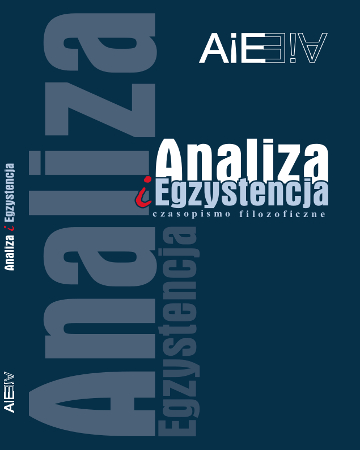
ISSN: 1734-9923
eISSN: 2300-7621
OAI
DOI: 10.18276/aie.2019.47-03





Lista wydań /
47 (2019)
The context principle and the idea of explaining meaning as from the outside
| Autorzy: |
Jan
Wawrzyniak

Uniwersytet Pedagogiczny w Krakowie |
| Słowa kluczowe: | context principle Frege holism full-blooded theory of meaning modest theory of meaning Dummett McDowell Stroud. |
| Data publikacji całości: | 2019 |
| Liczba stron: | 24 (55-78) |
Abstrakt
The aim of my article is to show that accepting the context principle (CP) almost inevitably leads to a rejection of the project of giving a completely general explanation of linguistic meaning. I will argue that it is difficult to reconcile CP with any version of the project of giving such an explanation of meaning that does not appeal to semantic terms. I will begin with a short characterization of CP. I will outline the reading of CP which I myself embrace. Then I will briefly characterize the difference between the idea of explaining the meanings of linguistic expressions from outside of any language, and that of doing so from inside of a language. Then I will move on to the main point of my article, arguing that it is difficult to render the consequences of CP compatible with the idea of an explanation of meaning external to all linguistic content.
Pobierz plik
Plik artykułu
Bibliografia
| 1. | Bar-Elli, G. (1997). Frege’s context principle. Philosophia, 25 (1-4), 99-129. |
| 2. | Bronzo, S. (2011). Context, Compositionality and Nonsense in Wittgenstein’s Tractatus. In: R. Read and M. Lavery (eds.), Beyond the Tractatus Wars (84-111). London: Routledge. |
| 3. | Davidson, D. (1984). Truth and Meaning. In: D. Davidson, Inquiries into Truth and Interpretation (17-36). Oxford: Oxford University Press. |
| 4. | Davidson, D. (1996). The Folly of Trying to Define Truth. The Journal of Philosophy, Vol. 93, No. 6, 263-278. |
| 5. | Diamond, C. (1991). What Nonsense Might Be. In: C. Diamond, The Realistic Spirit – Wittgenstein, Philosophy, and the Mind (95-114). Cambridge Mass. & London: MIT Press. |
| 6. | Dummett, M. (1973). Frege: Philosophy of Language. London: Duckworth. |
| 7. | Dummett, M. (1987). Reply to John McDowell. In: B. Taylor (ed.) Michael Dummett: Contributions to Philosophy (253–268). Dordrecht: Martinus Nijhoff. |
| 8. | Dummett, M. (1993a). Preface. In: M. Dummett, The Seas of Language (vii-xvii). Oxford: Clarendon Press. |
| 9. | Dummett, M. (1993b). What is a Theory of Meaning? I. In: M. Dummett, The Seas of Language (1-33). Oxford: Clarendon Press. |
| 10. | Dummett, M. (1993c). What Do I Know when I Know a Language?. In: M. Dummett, The Seas of Language (94-105). Oxford: Clarendon Press. |
| 11. | Dummett, M. (1993d). The Logical Basis of Metaphysics. Cambridge Mass.: Harvard University Press. |
| 12. | Fodor, J. (2008). LOT 2 The Language of Thought Revisited. Oxford: Oxford University Press. |
| 13. | Fodor, J. (1992). A Theory of Content and Other Essays. Cambridge Mass. & London: MIT Press. |
| 14. | Frege, G. (1959). The Foundations of Arithmetic. Oxford: Blackwell. |
| 15. | Frege, G. (1979). Notes for Ludwig Darmstaedter. In: H. Hermes, F. Kambalter, F. Kaulbach (eds.) Posthumous Writings (253-257). Oxford: Blackwell. |
| 16. | Glock, H.J. (2004). All kinds of nonsense. In: E. Ammereller & E. Fisher (eds.), Wittgenstein at Work: Method in the Philosophical Investigations (221-245). London& New York: Routledge. |
| 17. | Kripke, S. (1982). Wittgenstein on Rules and Private Language. Cambridge Mass.: Harvard University Press. |
| 18. | Mackie, J. L. (1990). Ethics: Inventing Right and Wrong. London: Penguin. |
| 19. | McDowell, J. (1998a). In Defence of Modesty. In: J. McDowell, Meaning, Knowledge, and Reality (87-107). Cambridge Mass.: Harvard University Press. |
| 20. | McDowell, J. (1998b). Another Plea for Modesty, In: J. McDowell, Meaning, Knowledge, and Reality (108-131). Cambridge Mass.: Harvard University Press. |
| 21. | McDowell, J. (2007). Dummett on Truth Conditions and Meaning. In: R.E. Auxier, L.E. Hahn (eds.), The Philosophy of Michael Dummett (351-366). Chicago: Open Court. |
| 22. | Mohanty, J. N. (1997). The Concept of 'Psychologism' in Frege and Husserl. Philosophy & Rhetoric, Vol. 30, No. 3, The Dialectics of Psychologism, 271-290. |
| 23. | Putnam, H. (1992). Meaning Holism. In: H. Putnam, Realism with a Human Face (278-302). Cambridge Mass.: Harvard University Press. |
| 24. | Quine, W.V.O. (1961). Two dogmas of Empiricism. In: W.V.O. Quine, From a Logical Point of View (20-46). New York: Harprer Torchbooks. |
| 25. | Strawson, P.F. (1992). Analysis and Metaphysics. Oxford: Oxford University Press. |
| 26. | Stroud, B. (2000a). Meaning, Understanding, and Translation. In: B. Stroud, Meaning, Understanding, and Practice. Philosophical Essays (113-130). Oxford: Oxford University Press, http:/dx.doi.org/10.1093/0199252149.003.0008. |
| 27. | Stroud, B. (2000b). Mind, Meaning, and Practice. In: B. Stroud, Meaning, Understanding, and Practice. Philosophical Essays (170-192). Oxford: Oxford University Press, http:/dx.doi.org/10.1093/0199252149.003.0011. |
| 28. | Stroud B. (2000c). The Theory of Meaning and the Practice of Communication, In: B. Stroud, Meaning, Understanding, and Practice. Philosophical Essays (193-212). Oxford: Oxford University Press, http:/dx.doi.org/10.1093/0199252149.003.0012. |
| 29. | Wittgenstein, L. (1922), Tractatus Logico-Philosophicus. London: Routledge. |
| 30. | Wittgenstein, L. (1974). Philosophical Investigations. Oxford: Blackwell. |
| 31. | Wittgenstein, L. (1974). Culture and Value. G.H. von Wright (ed.). Oxford: Blackwell. |